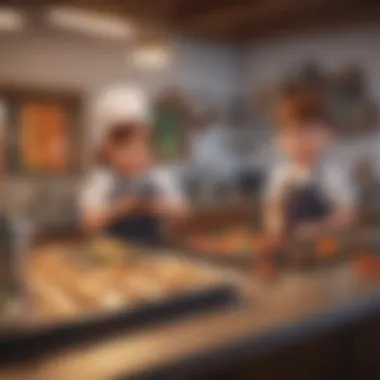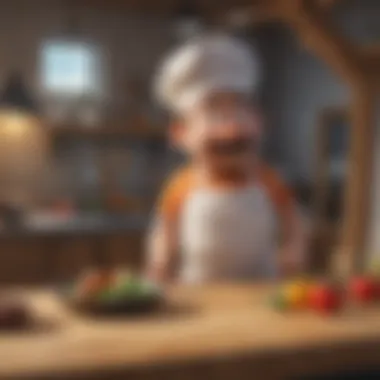Mastering Overcooked 2 on Switch: A Comprehensive Guide


Intro
Overcooked 2 on the Nintendo Switch presents a frenetic culinary experience that combines strategy, time management, and teamwork. As players engage in various cooking challenges, they step into the shoes of chefs tasked with preparing dishes in increasingly chaotic kitchens. This guide will explore the game’s mechanics, multiplayer dynamics, and design evolution, providing insights that benefit both beginners and seasoned gamers alike.
The world of Overcooked 2 is rich with content, from its diverse levels to unique characters. Each aspect contributes to a vibrant gameplay experience. Understanding these elements allows players to improve their skills and foster better teamwork. In turn, it enhances the overall enjoyment of the game.
Games News
Latest Updates
The gaming industry is constantly evolving, and Overcooked 2 is no exception. Recent updates have introduced new content and features, keeping the game fresh for returning players. The developers frequently roll out patches and downloadable content (DLC) that enhance gameplay and expand available recipes.
Breaking Stories
There are significant developments that impact how players approach Overcooked 2. For example, a recent announcement confirmed the upcoming appearance of new chefs and cuisines in the next DLC pack. This news excited the community, igniting discussions on platforms like Reddit about strategies and expected challenges.
Trending Topics
The cooking genre continues to gain traction in the gaming community. Discussions about co-op gaming in Overcooked 2 are prevalent, as players analyze how teamwork influences success. Moreover, debates surrounding the difficulty level in multiplayer settings keep drawing attention.
Gameplay Mechanics
Overcooked 2's gameplay mechanics are central to its appeal. The game involves a series of objectives that players must complete within a time limit. To succeed, communication and cooperation between players are crucial. The game’s controls are intuitive, yet mastering each kitchen’s layout and recipe is essential. Understanding the flow of each level can greatly improve efficiency.
Furthermore, Overcooked 2 introduces concepts like food delivery and ingredient management which add layers to gameplay. Each kitchen poses unique challenges, such as moving platforms or changing layouts. Adapting strategies to these obstacles is key to progressing through the game.
Unique Features
Game Spotlights
In addition to its primary content, Overcooked 2 features hidden gems within its structure. Unlockable levels and special challenges often provide players with unique cooking scenarios that enhance the gaming experience. Exploring these options is rewarding and adds depth to standard gameplay.
Developer Insights
The creators of Overcooked 2 have shared valuable insights into their design choices. In interviews, they emphasized the importance of player interaction and the joy of shared experiences. This intention is apparent in the laughter and frustration players often express while engaging in cooperative play. The challenges push players to communicate effectively and build teamwork skills.
Event Coverage
Gaming events often shine a light on Overcooked 2, showcasing its strong community presence. During conventions, players can test their skills against one another. These events often spark enthusiasm and foster camaraderie among fans, demonstrating the game’s impact beyond just entertainment.
“Overcooked 2 serves not only as a game but also as a medium for social connection.”
Ultimately, Overcooked 2 for the Nintendo Switch exemplifies a blend of strategic thinking and teamwork in gaming. This guide aims to assist players in navigating the culinary chaos effectively, ensuring a more enjoyable experience.
Overview of Overcooked
The exploration of Overcooked 2 merits attention due to its unique contributions to the gaming landscape, especially on the Nintendo Switch. This section provides a foundational understanding of the game's concept and theme, as well as its evolution from the original title. Understanding these aspects lays the groundwork for appreciating the gameplay mechanics and community dynamics that are central to the experience.
Game Concept and Theme
Overcooked 2 introduces players to a lighthearted yet frantic kitchen environment where teamwork is crucial. Players take on the role of chefs, tasked with preparing various orders within a limited time frame. The game emphasizes collaboration and coordination among players, encouraging effective communication and synergy. The whimsical art style and humorous narrative elements enhance the catering experience. The theme encapsulates chaos and camaraderie, as players navigate a multitude of cooking challenges that become increasingly difficult.
The game integrates various cooking styles, including the preparation of dishes like sushi, burgers, and soups, representing culinary diversity. Each dish requires players to gather ingredients, cook them, and then serve them, all while managing unexpected kitchen hazards like moving platforms and obstacles. This blend of frantic activity and cooperation captures the essence of working together to achieve a common goal, making it a staple for both casual and seasoned gamers.
Key Differences from Original Overcooked
Overcooked 2 expands upon its predecessor by introducing several significant features and improvements. One of the most prominent changes is the addition of online multiplayer, allowing players to connect and collaborate with friends or strangers across the globe. This enhancement significantly broadens the game's accessibility and replayability, making it relevant in today's social gaming landscape.
Additionally, Overcooked 2 not only offers new levels and recipes but also introduces creative mechanics like food throwing, which adds a tactical dimension to gameplay. Players can now strategize by throwing ingredients across the kitchen instead of merely running back and forth. The level design has also seen enhancements, presenting a more varied set of challenges, each with unique layouts and environmental hazards that test players' adaptability.
The introduction of new customer types and their preferences further enriches the gameplay, making each cooking scenario feel distinct and tailored. As a result, Overcooked 2 can provide a refreshingly dynamic experience that differentiates it from its predecessor, appealing to both fans of the original game and newcomers alike.
Gameplay Mechanics


Gameplay mechanics are the backbone of Overcooked 2. They shape player interaction and influence the way challenges unfold. Understanding these mechanics is crucial for maximizing both enjoyment and efficiency while playing. The game emphasizes teamwork and communication, making gameplay mechanics not just functional, but a central aspect of the overall experience.
Core Gameplay Loop
The core gameplay loop in Overcooked 2 revolves around preparing and serving meals under a time constraint. Players must cooperate to gather ingredients, cook dishes, and plate them for customers. The urgency and pressure add tension, while also encouraging players to strategize on the fly. Each loop consists of the following steps:
- Collecting Ingredients: Players gather various ingredients needed for specific recipes.
- Cooking: Ingredients must be chopped, cooked, or combined in correct order. Timely actions are essential.
- Serving: Completed dishes must be plated and delivered to customers to earn points.
- Cleaning Up: After serving, players may need to wash dirty dishes for further cooking.
This loop repeats for each level, making efficiency and coordination keys to success.
Levels and Objectives
Levels in Overcooked 2 vary significantly in design and objectives. Each level introduces new challenges, requiring players to adapt their strategies. Objectives typically involve serving a certain number of meals within a time limit, based on the active menu. Successfully completing these objectives enhances the sense of achievement. Levels progressively unlock in difficulty, pushing players' skills and teamwork.
Kitchen Dynamics
Kitchen dynamics play a vital role in shaping the gameplay experience. Each kitchen presents unique challenges, integrating different elements that require players to adapt their strategies frequently.
Layout Variations
Layout variations in the kitchen can dramatically influence gameplay. Some kitchens feature moving platforms or separated areas that players must navigate. These unique configurations often force players to alter their normal routines and communication styles. A well-designed layout can enhance teamwork, but poor navigation can lead to chaotic situations.
The main advantage of layout variations is the increased strategic depth they introduce. Players must think critically about their movements and actions. However, these layouts can also lead to confusion, especially for those unfamiliar with them.
Environmental Hazards
Environmental hazards add another layer of complexity to the game. Hazards like fire, falling ingredients, or hazardous weather conditions demand players remain vigilant. They can disrupt cooking or serving processes, creating additional stress.
The primary appeal of environmental hazards is that they increase engagement. Players must not only focus on tasks but also manage these hazards effectively. Nevertheless, they can sometimes feel punishing, particularly if players are unprepared.
Ingredient Management
Managing ingredients is crucial for success in Overcooked 2. Players must track available resources and use them efficiently to meet customer demands. Effective ingredient management leads to fewer delays and smoother operations.
Key aspects of ingredient management include:
- Inventory Awareness: Knowing which ingredients are available and needed helps prevent wasted time.
- Prioritization: Deciding which dishes to prepare first can significantly impact scoring.
The unique feature here is that good ingredient management fosters a cooperative spirit. However, if one player fails to communicate effectively, it can lead to chaos and frustration. Understanding these mechanics is essential for improving the overall gameplay experience.
Multiplayer Experience
Multiplayer experience is one of the core attractions of Overcooked 2. The game cultivates an environment where players must work collaboratively or competitively, enhancing their overall gaming experience. This section will explore the various aspects of multiplayer gameplay, highlighting the benefits and things to consider.
Cooperative Gameplay
In Overcooked 2, cooperative gameplay forms the foundation of its multiplayer experience. Players assume roles within a team where communication and quick decision-making are essential. Success hinges on understanding team dynamics. You may find that the game rewards those who strategize and coordinate efforts effectively. Proper roles, like kitchen assistant, head chef, or ingredient gatherer, can significantly increase efficiency.
A key benefit is the shared thrill of success. Completing a challenging level together can create a satisfying sense of achievement. However, players should be aware of potential frustrations that may arise. Miscommunication or lack of coordination can lead to chaos, especially during rushed moments. It is vital to establish clear communication methods, which can help maintain focus during intense cooking sessions.
"Effective communication transforms gameplay from chaotic to coordinated."
Competitive Elements
While cooperation is a significant aspect of Overcooked 2, competitive elements drive excitement and engagement. Players can compete against one another in various formats. Whether in a free-for-all cook-off or against the clock, the edge of competition adds a new layer to gameplay.
Competitively, individuals can strategize to outperform others. Each player’s culinary skills can impact the outcome of the game. In competitive settings, rivalry often leads to a more intense experience. However, balance is essential. Aiming for high scores without sabotaging teammates is a challenging yet rewarding aspect of the game. Evaluating strategies and adapting to opponents can lead to an enjoyable competitive edge.
Online vs.
Local Play
The choice between online and local play offers flexibility in how players engage with Overcooked 2. Local multiplayer allows friends to gather and share the gaming experience physically. It creates a unique social environment that can enhance interaction and enjoyment. Many players cherish the laughs and conversations that arise in shared spaces.


Online play, in contrast, enables players to connect globally. It offers a broader range of interaction, allowing players to team up with anyone. However, online gameplay presents challenges such as latency issues or communication barriers. Selecting the ideal mode depends on what players value in their experience—personal interaction or connecting across distances.
Both modes offer robust features, ensuring players can enjoy the multiplayer experience in a way that suits them best. The flexibility of Overcooked 2 strengthens its appeal, catering to diverse player preferences and social situations.
Game Features
The game features in Overcooked 2 are integral to understanding the complexity and depth of this culinary experience. They enhance gameplay dynamics and add layers of strategy, encouraging players to adapt to new scenarios and challenges. Each feature not only offers variety but also requires a level of engagement that enhances cooperation and competition among players.
New Recipes and Ingredients
In Overcooked 2, the introduction of new recipes and ingredients revitalizes the cooking experience. Players encounter an expanded menu that includes not just traditional dishes but also new items like sushi, cakes, and even desserts. This variety deepens the gameplay, as players must learn to efficiently gather, prepare, and serve these items.
Additionally, new ingredients like tomatoes and mushrooms introduce their own management challenges. Players must coordinate effectively to ensure that all components reach the cooking stations on time. This aspect of food preparation emphasizes teamwork and cunning planning.
Key considerations include:
- Ingredient Dependencies: Some recipes require multiple ingredients to be combined. Understanding these dependencies can improve efficiency.
- Preparation Order: Knowing which dishes take longer can help prioritize actions during busy levels.
Customer Types and Preferences
Overcooked 2 also diversifies its customer base. Different customers have varying preferences, which affects the gameplay. Understanding these preferences can result in faster service and better performance. For instance, some customers are patient and will wait longer for their meals, while others demand immediate attention.
This characteristic adds a compelling layer to rush scenarios. Players must adapt their strategies based on the type of customers being served, emphasizing skillful time management and coordination.
Customers can generally be categorized as:
- Patient Customers: These customers will willingly wait a bit longer than usual.
- Impatient Customers: These customers will leave if their order takes too long, resulting in a loss of points.
Unique Challenges and Events
Unique challenges and events punctuate the gameplay in Overcooked 2, adding unpredictability. These challenges often require players to change their strategies on the fly. For example, some levels may introduce moving platforms or environmental obstacles, such as fires or floods, that disrupt the normal flow of orders and tasks.
The events often reflect thematic elements, like holidays or seasons, making gameplay feel fresh each time. They bring players together, creating memorable moments while testing their ability to adapt.
Such challenges can include:
- Timed Events: Completing specific tasks within a duration can earn bonus points.
- Environmental Hazards: Being aware of surroundings can prevent failures.
Strategic Play: Tips and Tricks
In Overcooked 2, effective strategic play is essential for success, especially in multiplayer settings. The game demands players not only to cook but also to effectively manage their time and coordinate with teammates. Understanding how to optimize gameplay through strategic tips can greatly enhance the overall experience and lead to better performance in challenging levels.
Communication Strategies
Clear communication is vital when playing Overcooked 2, as it helps streamline tasks among players. Using simple and straightforward language can prevent misunderstandings. Here are some effective communication strategies:
- Assign Roles: Before starting a level, discuss who will handle each aspect of the kitchen, like chopping, cooking, or plating.
- Use Callouts: Quickly mention what ingredients are needed, or when food is about to burn. This ensures everyone is on the same page.
- Establish Signals: If voice chat is not available, establish simple signals or phrases that can be used to communicate in-game without wasting time.
Implementing these strategies improves teamwork and efficiency significantly, allowing players to focus more on the cooking rather than on figuring out who should do what.
Time Management Skills
Time management is crucial in Overcooked 2, especially when facing the ticking clock in levels. Players must develop the ability to prioritize tasks effectively. Here are some ways to enhance time management in the game:
- Prioritize Orders: Understand which orders are worth more points and focus on them first. This can optimize scoring.
- Plan Ahead: Before the round starts, look at the layout and identify potential bottlenecks or obstacles in the kitchen to mitigate issues before they arise.
- Stay Organized: Keep ingredients in designated areas to minimize movement time. If possible, create assembly lines for cooking processes.
With proper time management, players can reduce chaos and create a more harmonious gameplay environment, which is crucial for success in later levels.
Best Character Choices
Character selection can impact gameplay subtly due to varied character speeds and abilities. While the difference may seem minor, choosing the right character can enhance efficiency during gameplay. Consider these points when selecting characters:
- Speed Differences: Some characters move faster or can carry items more effectively. Use faster characters in levels requiring quick movements.
- Visual Traits: Choose characters that are easy to identify during swift gameplay, especially in hectic scenes.
- Team Dynamics: Select characters that complement each other. For example, pairing a speedy character with one that has a good carrying skill can balance strengths and weaknesses.


Choosing wisely can lead to a smoother operation in the kitchen and improve overall team performance.
Effective strategic play combines communication, time management, and the right character choices to navigate the bustling world of Overcooked 2. Mastering these elements can elevate both individual and team success.
Updates and Expansions
The updates and expansions for Overcooked 2 significantly extend the game's lifespan and enhance its appeal. Regular updates not only introduce new content but also refine existing mechanics based on player feedback. This section explores two essential aspects: DLC releases and patch notes, illustrating their importance for both casual players and seasoned gamers.
Releases
DLC (Downloadable Content) for Overcooked 2 has enhanced the game through several exciting expansions. Each DLC brings new recipes, levels, and characters, adding depth and variety to the core gameplay experience. Players can expect new challenges that test their culinary skills in unique environments. Some notable expansions include the Surf 'n' Turf, Carnival of Chaos, and All You Can Eat packs, each boasting distinct themes and exciting new features.
The introduction of these expansions not only keeps the gameplay fresh but also appeals to those who crave more content. With additional recipes, players can experiment with new culinary solutions, creating a dynamic atmosphere. This encourages collaboration and strategic planning. Investing in DLC releases is crucial for maximizing long-term enjoyment of the game.
Patch Notes and Changes
Regular patch updates help maintain the game's balance and address any issues players might experience. The developers at Ghost Town Games have shown a commitment to improving overall gameplay through these updates. Patch notes detail the modifications made, ensuring transparency and encouraging player engagement.
Common updates include:
- Bug fixes that resolve technical issues and glitches.
- Balancing tweaks to ensure fair gameplay.
- New settings and options based on community feedback.
These changes help maintain a stable gaming environment. By actively listening to the community, the developers create a more enjoyable experience, enhancing user satisfaction. Players should stay informed about patch notes to understand how updates could impact their gameplay.
"The ongoing support through updates ensures that Overcooked 2 remains relevant and enjoyable for all players."
Community and Reception
Community and reception play a vital role in the life of any game, particularly one as engaging as Overcooked 2. Players' feedback, interactions, and experiences shape ongoing development and even future titles from the developers. This section focuses on the significance of community engagement and reception for this game, delving into what gamers think and the events that keep them connected.
Player Feedback and Reviews
Player feedback can reveal much about the strengths and weaknesses of Overcooked 2. Reviews from various gamers are often available on platforms like Reddit or Facebook, where players share their insights on gameplay mechanics, difficulty, and overall enjoyment. Many reviews highlight the creativity in level design and the increased complexity of tasks compared to the original game. However, some players find certain levels frustrating due to complex layouts and fast-paced requirements.
The reviews often emphasize the sheer fun that multiplayer modes bring, allowing friends and family to collaborate or compete. Comments indicate that communication often impacts success or failure in a kitchen franchise environment.
“Working as a team is the key to success in Overcooked 2,” says one avid player review.
In addition, constructive criticism aids developers like Ghost Town Games in identifying areas that require attention. DLC releases based on this feedback show the developers' commitment to enhancing game play. Therefore, by aggregating experiences and suggestions, the community actively affects how the game evolves over time.
Tournaments and Events
Competitive aspects of Overcooked 2 are enhanced through online tournaments and community events. Such tournaments allow players to showcase their skills on larger platforms. They also foster a cooperative spirit that extends beyond the screen, connecting players across different geographical locations through competitive play.
Events, whether organized as part of gaming festivals or online challenges, create a vibrant atmosphere. They bring a sense of excitement and urgency, driving players to refine their time management and coordination skills. Participation allows players to meet like-minded individuals who share a love for the culinary chaos.
Given the game's accessible nature, these tournaments often attract both casual and professional players, which expands the community further. Moreover, the developers sometimes support these events, offering prizes or recognition that ensure they gain continuous traction within the gaming world.
Final Thoughts
The conclusion of this guide is crucial as it brings together all previously discussed elements of Overcooked 2 on the Nintendo Switch. This section serves to crystallize the insights gained throughout the article, highlighting the richness of the game's design and its multifaceted gameplay. Understanding these final thoughts can significantly enhance a player's appreciation and strategic approach to the game.
Overall Experience and Value
Overall, Overcooked 2 delivers an engaging experience that combines chaos, strategy, and teamwork. The balance of fast-paced action with strategic planning creates an enjoyable dynamic for both novice and seasoned players. Its rich variety of levels and objectives keeps the gameplay fresh and exciting, ensuring that there is always something new to tackle.
Players can experience a real sense of achievement as they progress, mastering the mechanics and overcoming the game's challenges. The cooperative nature fosters communication and collaboration, which often leads to memorable moments filled with humor and shared triumphs.
Furthermore, the game's accessibility makes it approachable for a wide audience. The straightforward controls and clear objectives allow players to jump right in without needing extensive tutorials. This is particularly appealing for casual gamers, while still providing enough depth to satisfy those seeking more complex strategies.
- Key benefits include:
- Enhanced social interaction through multiplayer.
- Continuous updates and expansions keep the game engaging.
- A diverse range of characters and cooking styles.
Future of Overcooked
Looking ahead, the future of Overcooked 2 appears bright. With ongoing support from the developers, new content such as downloadable content (DLC) is likely to continue enriching the gameplay experience. Fans can expect more recipes, levels, and unique challenges that build on the core experience.
Additionally, the growing community around the game hints at a sustainable player base. This environment fosters collaboration and competition through tournaments and events, further enhancing the game's longevity. Regular feedback from players can guide future updates, ensuring they align with community desires and expectations.
In summary, Overcooked 2 is not merely a game but a continuing evolving platform for culinary adventure. Players should remain optimistic about what lies ahead as new content and features are inevitably on the horizon.



